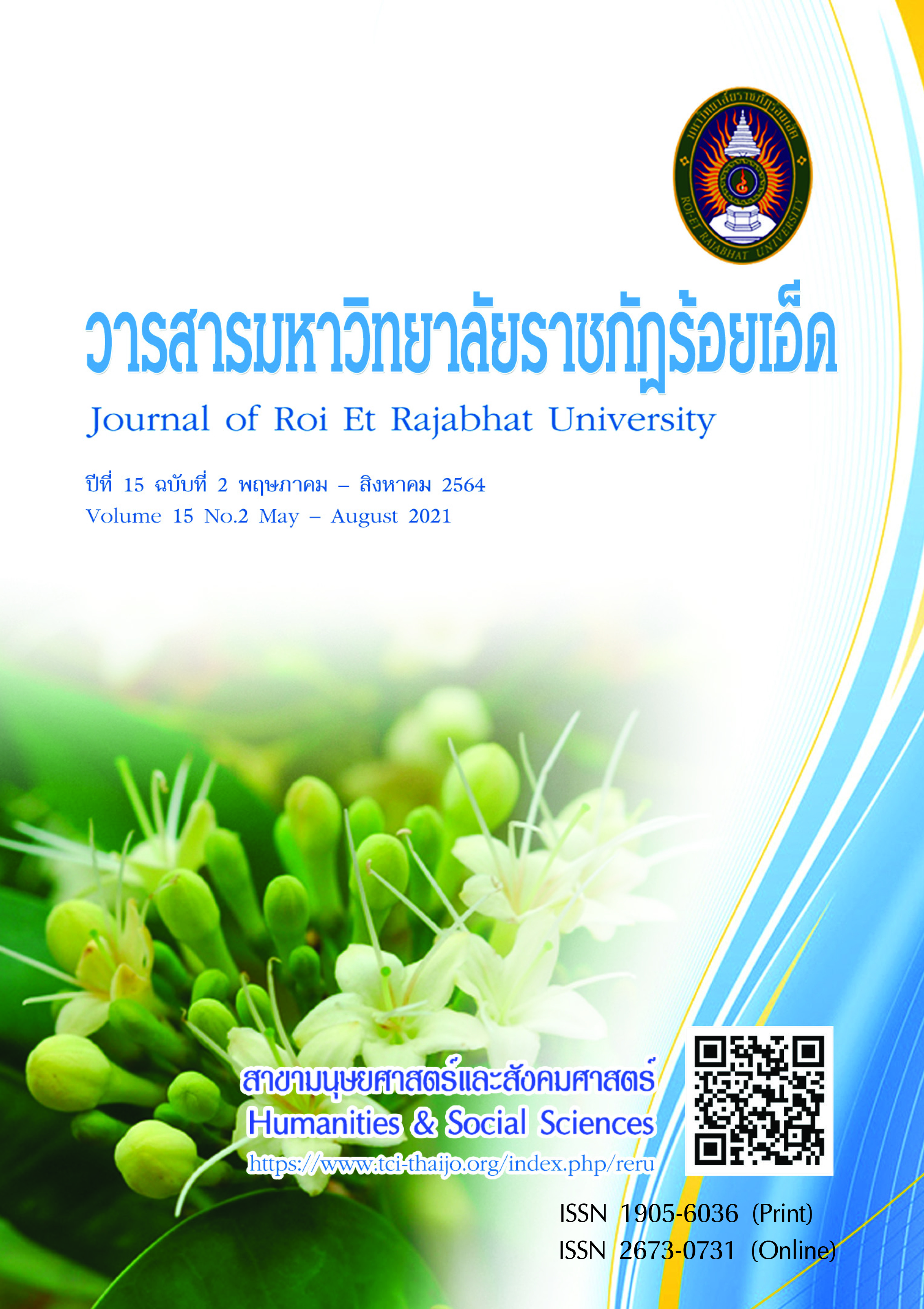The Impact of Entrepreneur Characteristic of Gen Y on Business Success in Phitsanulok
Keywords:
Entrepreneur Characteristic / Business Success / Gen YAbstract
การวิจัยนี้มีวัตถุประสงค์ คือ 1) เพื่อศึกษาความสัมพันธ์ของคุณลักษณะของผู้ประกอบการ Gen Y ที่มีอิทธิพลต่อความสำเร็จในการดำเนินธุรกิจในจังหวัดพิษณุโลก 2) เพื่อศึกษาอิทธิพลของคุณลักษณะของผู้ประกอบการ Gen Y ที่มีต่อความสำเร็จในการดำเนินธุรกิจในจังหวัดพิษณุโลก ซึ่งงานวิจัยนี้ใช้กลุ่มตัวอย่างคือ ผู้ประกอบการธุรกิจในจังหวัดพิษณุโลก จำนวนทั้งสิ้น 400 คน โดยทำการสุ่มแบบสะดวก เครื่องมือที่ใช้ในการวิจัยเป็นแบบสอบถาม 5-likert scales สถิติที่ใช้ในการวิเคราะห์ข้อมูล ได้แก่ สถิติเชิงพรรณนา (ค่าร้อยละ, ค่าเฉลี่ย, ส่วนเบี่ยงเบนมาตรฐาน) สถิติเชิงอ้างอิง (Multiple regression analysis)
ผลการศึกษา พบว่า 1) คุณลักษณะของผู้ประกอบการมีอิทธิพลในเชิงบวกต่อความสำเร็จในการดำเนินธุรกิจ 2) คุณลักษณะของผู้ประกอบการ ซึ่งมีองค์ประกอบ 5 องค์ประกอบ ได้แก่ การมีอิสระในการบริหารงาน ความมีนวัตกรรม ความกล้าเสี่ยง และความกล้าที่จะแข่งขันมีอิทธิพลในเชิงบวกกับความสำเร็จในการดำเนินธุรกิจ แต่การทำงานในเชิงรุกไม่มีอิทธิพลในเชิงบวกต่อความสำเร็จในการดำเนินธุรกิจ ซึ่งในภาพรวมของคุณลักษณะของผู้ประกอบการมีอิทธิพลในเชิงบวกกับความสำเร็จในการดำเนินธุรกิจ สามารถสะท้อนให้เห็นถึงความสำคัญของคุณลักษณะดังกล่าวในการเป็นผู้ประกอบการธุรกิจที่ดีซึ่งมีความสำคัญในการแข่งขันทางธุรกิจในปัจจุบัน[1]
The aims of this research were 1) to study the relationship between entrepreneur characteristics of gen Y and business success in Phitsanulok 2) to study the impact of entrepreneur characteristics and business success of gen Y’s entrepreneur in Phitsanulok. The samples were 400 entrepreneurs in Phitsanulok. The research tool was questionnaires that five likert’s scales. The statistics employed percentage, mean, standard deviation and multiple regression analysis in data analyzing.
The results of this research were as the followings: 1) Entrepreneur characteristics had positive influence on business success. 2) Autonomy, innovativeness, risk taking, proactiveness and competitive aggressiveness had positive influence on business success. The overall of entrepreneur characteristics had influence on business success. It reflected that entrepreneur characteristics were key factors for business in current competitive environment.
References
ฐานเศรษฐกิจ. (2560). ประชากรไทย Gen Y ใหญ่สุด พฤติกรรมสร้างโอกาส-ความเสี่ยง. สืบค้นเมื่อ 24 พฤศจิกายน 2562,
จาก https://www.thansettakij.com/content/234315
บุญใจ ศรีสถิตนรากูร. (2555). การพัฒนาและตรวจสอบคุณภาพเครื่องมือวิจัย : คุณสมบัติการวัดเชิงจิตวิทยา. กรุงเทพฯ:
จุฬาลงกรณ์มหาวิทยาลัย.
สำนักงานเทศบาลนครพิษณุโลก. (2559). แผนพัฒนาเทศบาลนครพิษณุโลกสี่ปี พ.ศ. 2561–2564. สืบค้นเมื่อ 2 ธันวาคม
, จาก http://dcstore.phsmun.go.th/test02/file_data/201701191152281.pdf
Altinay, L., Madanoglu, M., De Vita, G., Arasli, H., and Ekinci, Y. (2016). The Interface between Organizational
Learning Capability, Entrepreneurial Orientation, and SME Growth. Journal of Small Business Management,
(3), 871-891.
Arshad, A.S., Rasli, A., Arshas, A.A. and Zain, Z.M. (2014). The Impact of Entrepreneurial Orientation on
Business Performance: A Study of Technology-based SMEs in Malaysia. Procedia Social and
Behavioral Sciences, 130, 46-53.
Balas, A.N., Gokus, O. and Colakoglu, S.N. (2014). Exploring the Role of External Environment on Determining
Strategic Focus, Market Orientation and Firm Performance of Service Firms. Academy of Marketing
Studies Journal, 18(1), 19-40.
Coulthard, M. (2007). The Role of Entrepreneurial Orientation on Firm Performance and the Potential Influence
of Relational Dynamism. Journal of Global Business and Technology, 3(5), 29-39.
Covin, J., Green, K. M. and Slevin, D. P. (2006). Strategic Process Effects on the Entrepreneurial Orientation-
Sales Growth Rate Relationships. Entrepreneurship: Theory and Practice, 30(1), 57-81.
Dess, G.G., Lumpkin, G.T. and Eisner, A.B. (2007). Strategic management: Text and Case (3rd ed.). Boston:
McGraw-Hill.
Hair, Jr.J.F., Black, B.B., Babin, B.J. and Anderson, R.E. (2010). Multivariate Data Analysis: A global perspective
(7th ed.). New Jersey: Pearson Printice Hall.
Harms, R., Schulz, A., Kraus, S. and Fink, M. (2009). The Conceptualisation of 'Opportunity' in Strategic
Management Research. International Journal of Entrepreneurial Venturing, 1(1), 57-71.
Hwang, E. J. and Norton, J.T. (2014). Environmental Uncertainty, Market-Orientation Strategy and
Organizational Structure in China’s Apparel Retail Stores. Advancesin Business-Related Scientific
Research Journal, 5(1), 1-12.
Lawrence, P. R. and Lorsch, J.W. (1967). Organization and Environment: Managing Differentiation and Integration.
Boston, Massachusetts: Harvard University.
Lumpkin, G.T. and Dess, G.G. (1996). Clarifying the Entrepreneurial Orientation Construct and Linking It to
Performance. Academy of Management Review, 21(1), 135-172.
Mahmood, R. and Hanafi, N. (2013). Entrepreneurial Orientation and Business Performance of Women-
Owned Small and Medium Enterprises in Malaysia: Competitive Advantage as a Mediator.
International Journal of Business and Social Science, 4(1), 82-90.
Nunnally, J.C. and Bernstein, L.H. (1994). Psychometric Theory (3rd ed.). New York: McGraw-Hill.
Olaniran, M. and Narnusonge, N. (2016). The Role of Innovation on Performance of Firms on Nigeria Stock
Exchange. International Journal of Management and Social Science, 4(1), 3-10.
Otieno, S., Bwisa, H.M. and Kihoro, J.M. (2012). Influence of entrepreneurial orientation on Kenya’s
manufacturing firms operating under East African regional integration. International Journal of
Learning& Development, 2(1), 299–320.
Rahman, A., Civelek, M. and Kozubikova, L. (2016). Proactiveness, Competitive Aggressiveness and Autonomy:
A Comparative Study from the Czech Republic. Journal of Economics and Economic Policy,
(3), 631-650.
Rauch, A., Wiklund, J., Lumpkin, G.T. and Frese, M. (2005). Entrepreneurial Orientation and Firm Performance:
An Assessment of Past Research and Suggestions for the Future. Entrepreneurship Theory and
Practice, 19(7), 12-18.
Ruiz, J., Soriano, D.R., and Coduras, A. (2016). Challenges in Measuring Readiness for Entrepreneurship.
Management Decision, 54(5), 1022-1046.
Taiwo, F.A., Adesoga, A. and Olalekan, A. (2019). Effect of Entrepreneurial Orientation on Performance of
Selected Small and Medium Scale Enterprise in Ogun State Nigeria. International Journal of
Business and Management Invention, 8(1), 16-27.
Wambugu, A.W., Gichira, R., Wanjau, K.N. and Mungatu, J. (2015). The Relationship between Proactiveness
and Performance of Small and Medium Agro Processing Enterprises in Kenya. International
Journal of Economics, Commerce and Management, 3(12), 58-71.
Downloads
Published
How to Cite
Issue
Section
License
บทความที่ได้รับการตีพิมพ์เป็นลิขสิทธิ์ของวารสารมหาวิทยาลัยราชภัฎร้อยเอ็ด
ข้อความที่ปรากฏในบทความแต่ละเรื่องในวารสารวิชาการเล่มนี้เป็นความคิดเห็นส่วนตัวของผู้เขียนแต่ละท่านไม่เกี่ยวข้องกับมหาวิทยาลัยราชภัฎร้อยเอ็ด และคณาจารย์ท่านอื่นๆในมหาวิทยาลัยฯ แต่อย่างใด ความรับผิดชอบองค์ประกอบทั้งหมดของบทความแต่ละเรื่องเป็นของผู้เขียนแต่ละท่าน หากมีความผิดพลาดใดๆ ผู้เขียนแต่ละท่านจะรับผิดชอบบทความของตนเองแต่ผู้เดียว





